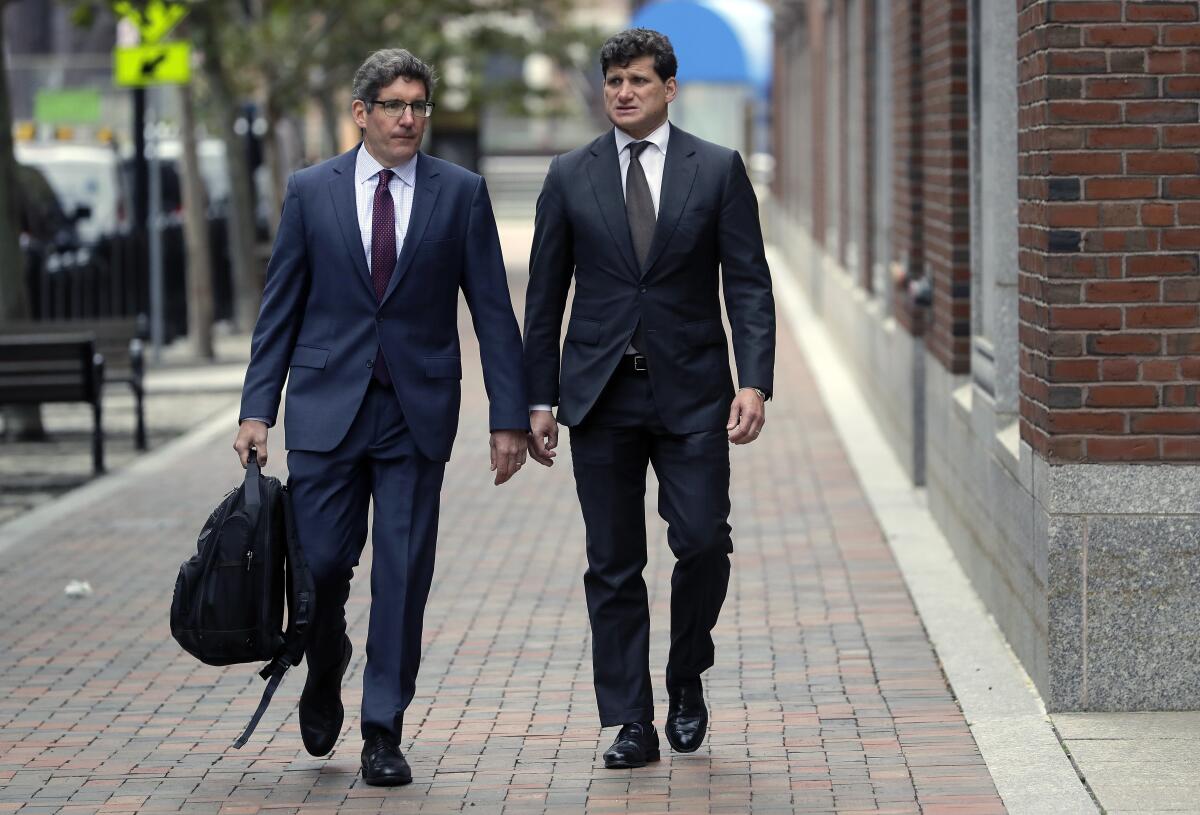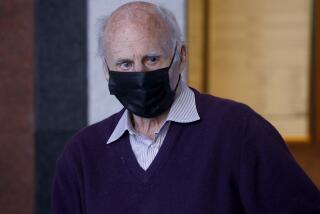Attorney who paid $75,000 to rig daughter’s ACT exam sentenced to 1 month in admissions scandal

- Share via
Having already lost his bar license and co-chairmanship at a prestigious law firm, Gordon Caplan on Thursday received a final rebuke from the legal system he once sat atop when he was sentenced to one month in prison for conspiring to rig his daughter’s college entrance exams.
Caplan, a resident of Greenwich, Conn., paid $75,000 to ensure his daughter received a score in the 97th percentile on the ACT. Her test was fixed by William “Rick” Singer, a Newport Beach consultant who has admitted rigging dozens of such exams for his wealthy clients by bribing test proctors and administrators.
Once a co-chairman of the global law firm Willkie Farr and Gallagher, Caplan, 53, was ordered incarcerated by U.S. District Judge Indira Talwani over the objections of his attorneys, who had argued Caplan was so disgraced, his career so ruined and his family so wounded by his misdeeds that prison wasn’t necessary.
Talwani disagreed.
Still, the judge came down on Caplan lighter than prosecutors had wanted. They had requested eight months, pointing to Caplan’s admission in a wiretapped phone call that he “wasn’t worried about the moral issue” of cheating. They also noted how he hired a lawyer to threaten the ACT with legal action when he feared the scam was unraveling, and that a “fixation on saving his own skin” pervaded nearly every recorded conversation he had with Singer.
“That a lawyer who has reached the apex of his profession could engage in such blatant criminality reveals a staggering disdain for the law,” Eric Rosen, an assistant U.S. attorney, wrote in a sentencing memorandum.
Caplan must also pay a $50,000 fine and perform 250 hours of community service, Talwani ruled. He is the fourth parent to be sentenced in the scandal. Agustin Huneeus, a Napa vintner, will appear before Talwani for sentencing on Friday. Prosecutors want him to be incarcerated for 15 months. His attorneys say two months in prison would be a fair punishment.
Caplan’s attorney, Joshua Levy, said his client would make no excuse for his crimes before sentencing, and nor had he ever. Levy noted Caplan was the first of the 33 parents arrested in March and charged in the admissions scandal to issue a public apology and admission of guilt, and the only parent to address the “frenzied media” that assembles outside the John Joseph Moakley United States Courthouse in Boston whenever a defendant in the case is due in court.
“He screwed up. He committed a crime. He has owned it,” Levy wrote in a sentencing memorandum.
A complaint unsealed in March and new documents filed by prosecutors last week lay out Caplan’s entry into Singer’s scheme, his eagerness to secure a top standardized test score for his daughter tempered by his wariness of getting caught.
“Keep in mind I am a lawyer,” he told Singer in one of many phone calls between the two recorded by FBI agents. “So I’m sort of rules-oriented.”
Had anyone, he wanted to know, ever gotten caught?
“The only one who could catch it is if you guys tell somebody,” Singer said.
“I am not going to tell anybody,” Caplan replied, and the two men shared a laugh.
Caplan, however, was still uneasy. Not “about the moral issue,” he clarified to Singer in another recorded call. “I’m worried about the, if she’s caught doing that, you know, she’s finished.”
Assured by Singer that no one had been caught in his “twenty-some-odd years” of fixing tests — Singer, in fact, was exaggerating the longevity of his scheme, which the government says lasted about a decade — Caplan agreed to pay $75,000 to secure his daughter a 32 out of 36 on the ACT, a score in the 97th percentile.
On the pretext of a college recruitment visit, Caplan flew with his daughter to Los Angeles in December 2018. Federal agents watched him drop off his daughter early on a Saturday morning at the West Hollywood College Preparatory School, whose director has acknowledged taking bribes from Singer in exchange for allowing an accomplice to fix exams taken there by the children of Singer’s clients.
Caplan returned five hours later to pick up his daughter. Unbeknownst to her, Caplan and the government say, Mark Riddell, Singer’s Harvard-educated test-taker, had corrected the girl’s answers after she’d finished the test.
The school’s director, Igor Dvorskiy, indicated Tuesday he would plead guilty to racketeering conspiracy and cooperate with prosecutors. Riddell and Singer have pleaded guilty to a number of felonies.
A month after Caplan’s daughter took the test, the scam hit a snag: The ACT told Caplan it wouldn’t score her test and was revoking the accommodation that had allowed her to take it in California. Caplan called Singer.
“Well,” Caplan said, “we’re [expletive].”
He told Singer he had hired a lawyer to force the ACT to score the test. He fretted, again, that the scam could be exposed and even splashed across “the front page of the Wall Street Journal.”
“But we — we did what we did,” he said.
Since his arrest March 12, Caplan has lost his co-chair post at Willkie Farr and Gallagher, where he had worked since 2002. He also stepped down from a dean’s council at his alma mater, Fordham Law School, and lost his bar license to an interim suspension that will soon become official, Levy wrote.
“Gordon’s hard-earned, spotless reputation, built over a 30-year career, is ruined,” he said.
Rosen, the federal prosecutor, laced into Caplan in his sentencing memorandum for “boasting” in media interviews of his pro bono work for Fordham Law. Caplan helped a law student in February 2017 bring her 12-year-old daughter into the country from Iran to treat a rare metabolic disease, despite President Trump’s travel ban barring Iranians from entering the country. Caplan also served on the board of Publicolor, a New York City nonprofit that helps schoolchildren repaint their schools.
“Like many con-men,” Rosen said, “Caplan committed his crime from behind a façade of feigned integrity.”
Levy, too, raised Caplan’s volunteer work ahead of his sentencing. But in Levy’s telling, Caplan did the work not to throw a smokescreen over his criminal conduct, but because he truly wanted to help young people succeed. His work didn’t stop after his arrest in March, Levy said.
More to Read
Sign up for Essential California
The most important California stories and recommendations in your inbox every morning.
You may occasionally receive promotional content from the Los Angeles Times.













